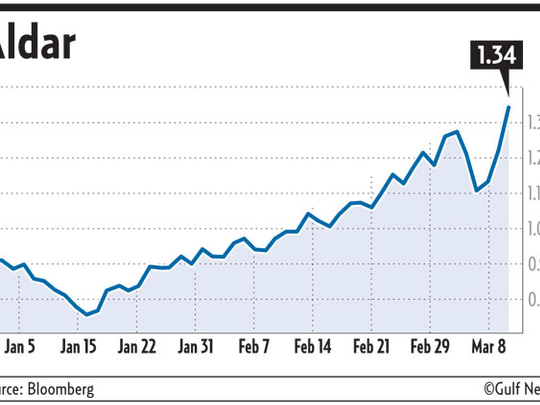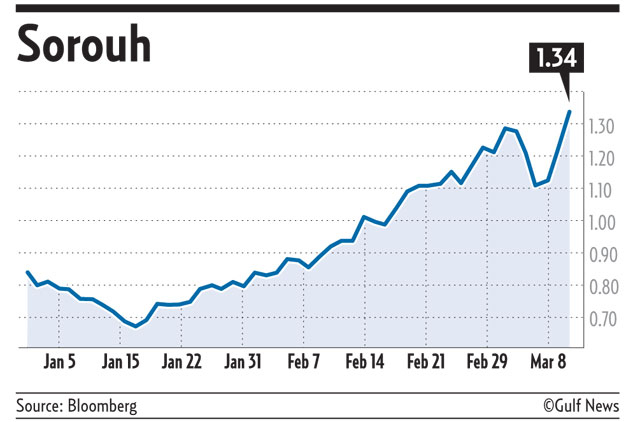
Dubai Predictably, the share prices of Aldar Properties and Sorouh Real Estate soared yesterday — jumping an identical 9.84 per cent and both ending the day on Dh1.34 — a sign that investors welcomed the idea of consolidation in the real estate market of Abu Dhabi.
Given the paucity of details at this stage, it is too early to predict what will happen to the merged entity's stock price, if and when it happens. But, analysts believe the share exchange ratio will be critical in determining who benefits the most from the final deal. At first glance, Aldar's shareholders would gain relatively more than those of Sorouh.
"Aldar's shareholders will particularly benefit from Sorouh's relatively underleveraged balance sheet," says Deon Vernooy, senior executive officer at Emirates NBD's asset management group. "Given that details are still sketchy, it is difficult to determine the valuation impact on both the stocks at this point."
Raghu Mandagolathur, senior vice-president, research at Kuwait Financial Centre (Markaz) agrees.
"We still don't have the ratio in which the merger will be worked out but on the face of it, Aldar shareholders will benefit the most," he says.
That's because of the way the companies have performed in the past few years. While Sorouh has managed to make a profit and maintain a reasonable amount of debt, Aldar has exhibited higher earnings volatility, swinging from Dh3.5 billion profits in 2008 to Dh12.6 billion loss in 2010. The government also had to infuse about Dh36 billion into the company in 2011.
"If the merger goes through, investors will hold shares in a larger entity but the question of whether it results in a stronger company with good cash generation capacity, will have to be still tested," says Mandagolathur. "The merger sends an important signal that the resource rich Abu Dhabi government is not going to let its real estate companies fail. This is an important factor for debt investors."
If the share exchange ratio is based on the balance sheet analysis of 2011, Saleem Khokhar, head of equities at National Bank of Abu Dhabi's asset management group, points out Aldar and Sorouh would contribute 52.6 per cent and 47.4 per cent respectively to the equity of the new company. That by implication, given Sorouh's underleveraged balance sheet, would mean Aldar's investors would be the gainers.
Details unclear
Many other factors that will need to be taken into account such as accounting treatment of the land banks, debt to equity, price to book, among others, when the deal is actualised, adds Khokhar.
In general terms, for equity investors, the merger, "appears to offer a way out from the recent distressed situation and could entail in a large upside potential for shareholders," says a note from Global Investment House, Kuwait. Aldar is currently trading at a trailing price to book multiple of 0.7 times while Sorouh is trading at 0.5x.
"Details remain unclear whether the merger between the two companies would be via a share swap creating a new entity or through blending the assets of one company into the other or any other form," the note added.
Haissam Arabi, chief executive of Gulfmena Investments, however, feels that for shareholders "it's a win-win even if you look at minority shareholder interest. In simple terms, you get a mega player with pricing power, a government backed institution and a solid balance sheet."
Opinion is mixed on how the Abu Dhabi market real estate sector will fare and the impact on the companies.
"The combined entity would be the key player in the Abu Dhabi real estate space and would benefit tremendously from Abu Dhabi growth plans," says Khokhar.
The consolidation looks well-timed given the lacklustre Abu Dhabi real estate environment, but Vernooy points out "the proposed merger is not the panacea as the new entity. If the merger does happen, will still face headwinds given significant upcoming deliveries of property units in Abu Dhabi in 2012-2013."
While the announcement is definitely a positive step from the government, "this may not help revive the sector, the merger will pave way to address the excesses that were created," says Mandagolathur.
"If both the companies re-look at their assets and projects and start restructuring their portfolio then it might throw in some positive surprise to the sector as a whole," he says.













